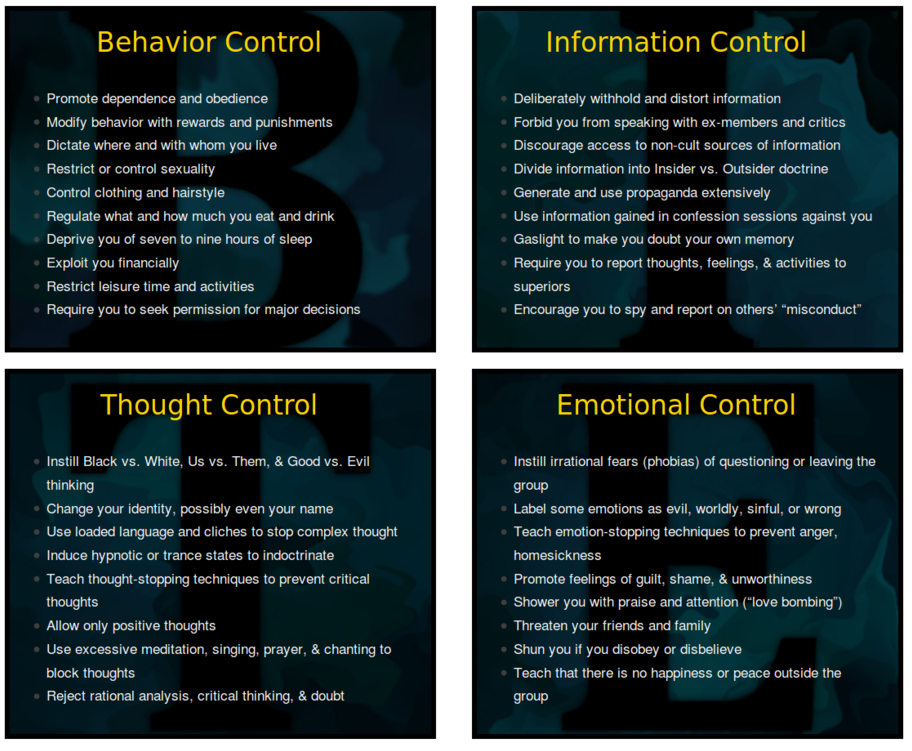ℹ️ What's the Difference between a Cult and a Religion, Movement or Organization with Strong Beliefs?
Last Updated: 1 year, 3 months ago
Is My Organization, Religion or Movement A Cult?
What is a Cult?
The Basic Definition of "Cult"
Firstly, in this article, we're talking about the strict modern non-colloquial definition of a cult.
i.e:
An organization or movement which controls or influences its members by indoctrinating them.
We're not talking about a traditional or archaic general meaning where "cult" was synonymous with a newer religion or small sect.
We're also not talking about the modern colloquial joking sense of referring to a fan club or a general following around a popular influencer or trend.
The "Cult" Label - and Definition - Really Matters
Drew of Genetically Modified Skeptic also takes a helpful look into various different sub-definitions one can use for this general modern meaning of "cult", in a video which does a good job of highlighting the problem of the use and misuse of this words and its various connotations - as well as the harm in watering down the non-colloquial implications of this term by demonizing any organisation we dislike as a "cult".
As a cult survivor myself, I strongly agree with him about the danger in watering down this term as a simple insult to discredit somebody, and thus disregarding the real damage cults do.
Identifying Cults
Finding A Meaningful and Helpful Way of Identifying a "Cult"
As Drew demonstrated, there are many cultural and technical criteria of a cult which differ depending on what is being assessed.
Masterclass has a great summary article on some common cult models and warning signs to look out for.
Outsider Perspectives Can be Very Limited in Identifying A Cult
An external perspective can be particularly limited when dealing with cults though, because cults are often covert, insidious and personal in their approach to members and recruitment, and their methods deliberately obscure internal workings from outsiders.
Examples of these methods in use is something Dr. Steven Hassan, PhD goes into detail on in this interview.
Dr. Hassan is an expert on undue influence, brainwashing, and unethical hypnosis and the founder of Freedom of Mind, a resource centre to support those affected by undue influence, and we will draw on his resources in a moment.
Identifying Cults by How They Control People As someone concerned with conversations of belief and deconstruction, skepticism, behaviour and mental health, I therefore find the most helpful way to identify a cult and cult indoctrination is in terms of psychological and behavioural definitions.
Understanding how cults actually affect and indoctrinate people individually is often more helpful to individuals in order to innoculate themselves or their loved ones or to help deconstruct their own past experiences, and doesn't rely on news media catch-up, external labelling and limited outsider perspectives in identifying cults.
Demonstrating Cult Control - Dr. Steven Hassan and the BITE Model
What is the BITE Model?
Dr Hassan wrote his dissertation on how The BITE Model of Authoritarian Control has been demonstrated via quantitative evidence to be an effective tool for evaluating cases involving exploitative control, undue influence, mind control or thought reform.
BITE is an acronym for Behavioural, Informational, Thought and Emotional, and the name refers to the types of control authoritarian leaders exert over their populations.
These tactics are also employed in cults and common in abusive relationships, as they are abusive control tactics.
BITE Model Examples
BITE model control can be exerted via various means, both overt and covert. Some examples of these means are via regulation, restriction, manipulation, discouragement, influence, applying psychological or social pressure, imposing consequences or punishments, requiring permission for private actions, or changing the individual's environment to enforce these levels of control.
How Cults Control People
Cult Control Levels Can Be:
Behavioural - over individual decisions, expressions, movement or bodily autonomy, discouraging individuality.
Informational - restricted or discouraged access to different opinions via media, perspectives or influences, in-group vs out-group thinking, lying, withholding information, promotion of own materials as superior to external sources, encouraging monitoring of or spying on members by other members, encouraging confessions, utilising confessions as blackmail or control tactics such as the need for forgiveness, manipulating memories of past events.
Thought - Require internalizing of certain beliefs, changing people's identities, teaching thought self-policing and thought-stopping techniques to halt rational thinking, discourage critical thinking or challenging questions, instil an alternative reality, label alternative beliefs illegitimate or evil, only encourage "good and proper" thoughts.
Emotional - Only certain emotions are allowed, teaching emotion-stopping techniques, teaching problems are only the group's fault not the leader's, promoting feelings of guilt and unworthiness, instil fear and phobias of leaving/disobeying/independence/abandonment etc and terrible punishments, extreme emotional experiences eg love bombing and then declaring you are a sinner, confession of sins, indoctrinate that no happiness can be found outside of the guilt, stigmatize people who leave.
A Visual summary of the BITE Model:
A slightly more detailed quick-reference guide to the types of Behaviour, Information, Thought and Emotional Control in the BITE model can also be found here, courtesy of Freedom of Mind.
Thanks for reading! Subscribe to my free newsletter or follow my RSS feed!
